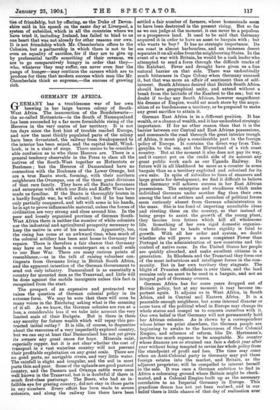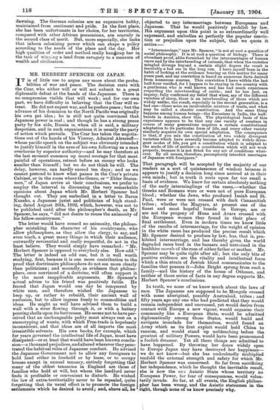G ERMA_NY has a troublesome war of her own brewing in
her large barren colony of South- West Africa. The insurrection of the Bondelswarts- the so-called Hottentots—in the South of Namaqualand has been succeeded by a far more formidable rising of the Hereros in the very centre of her territory. It is not ten days since the first hint of trouble reached Europe, and now the most thickly populated parts of the colony have been devastated, the railway from Swakopmund to the interior has been seized, and the capital itself, Wind- hoek, is in a state of siege. There seems to be consider- able confusion as to who these Hereros are. There is a general tendency observable in the Press to class all the natives of the South-West together as Hottentots or Bushmen ; but the Hereros of Damaraland have no connection with the Bushmen of the Lower Orange, but are a true Bantu stock, forming, with their northern neighbours the Ovampas, one of the three great divisions of that race family. They have all the Bantu fierceness and enterprise with which our Zulu and Kaffir Wars have made us familiar. If the Bantu is thoroughly beaten in a. hardly fought war, he will submit ; but if he has been only partially conquered, and left with arms in his hands, he is apt to prove inflammable material, unless the forces of civilisation are very strong and close around him. In the poor and loosely organised province of German South- West Africa there is neither the number of white colonists nor the industrial and agricultural prosperity necessary to keep the native in awe of his masters. Apparently, too, the rising has come at an awkward time, when much of the colonial artillery has been sent home to Germany for repairs. There is therefore a, fair chance that Germany may have on her hands a counterpart on a small scale to our Boer War. There are many curious points of resemblance,—as in the talk of raising volunteer con- tingents from Germans living in British South Africa, and the apparent intention of the German Government to send out only infantry. Damaraland is as essentially a country for mounted men as the Transvaal, and little will be done against the mobile insurgents unless this fact is recognised from the start.
The prospect of an expensive and protracted war raises the question of German colonial policy in its extreme form. We may be sure that there will soon be many voices in the Reichstag asking what is the meaning of it all. As we know, the German colonies are run at a loss, a considerable loss if we take into account the very limited scale of their Budgets. But is there in them any security for future wealth which will repay this pro- tracted initial outlay ? It is idle, of course, to dogmatise about the resources of a very imperfectly explored country, but we can say at least that Damaraland has not yet given its owners any great cause for hope. Minerals exist, especially copper, but it is not clear whether the cost of transport in a vast waterless country will not prevent their profitable exploitation on any great scale. There are no good ports, no navigable rivers, and very little water. The rainfall is slight and irregular, and the soil in most parts thin and poor. Some of the uplands are good pastoral country, and the Damara and Ovampa cattle were once well known in the Transvaal, but it is doubtful if there is much first-class pasturage. The Boers, who had an in- fallible eye for grazing country, did not stay in those parts in any numbers. Every effort has been made to secure colonists, and along the railway line there have been settled a fair number of farmers, whose homesteads seem to have been destroyed in the present rising. But so fai as we can judge at the moment, it can never be a populoin or a prosperous land. It used to be said that Germany acquired it in order to have an asset to bargain with ; but who wants to buy? It has no strategic importance. Its sea coast is almost harbourless, and an immense desert separates it on all sides from the neighbouring States. In the event of a war with Britain, he would be a rash leader who attempted to send a force through the difficult tracks of the Kalahari. Fever and drought have given us a fine natural barrier on that side. There was undoubtedly much bitterness in Cape Colony when Germany annexed it, but that was more an affair of sentiment than of self- interest. South Africans desired that British South Africa should have geographical unity, and extend without a break from the latitude of the Zambesi to the sea; but we doubt if to-day any South African, however magnificent his dreams of Empire, would set much store by the acqui- sition of so burdensome a territory, or be prepared to make any great sacrifice to attain it.
German East Africa is in a different position. It has wealth, or a chance of wealth, and it has undoubted strategic importance. If for no other reason than that it is the barrier between our Central and East African possessions, and commands the road through the great interior trough of Africa, it must play a considerable part in the foreign policy of Europe. It contains the direct way from Tan- ganyika to the sea, and. the Hinterland of a rich coast country. 'But at the moment it also does not pay its way, and it cannot put on the credit side of its account any great public work such as our Uganda Railway. Its future will in all likelihood be more as a counter in some bargain than as a territory exploited and colonised for its own sake. In spite of subsidies to lines of steamers and large grants for development, we find it difficult to believe that Germany will achieve success in her East African possessions. The enterprise and steadiness which make individual Germans under another flag than their own among the best of settlers and soundest of political forces seem curiously absent from German administration in the mass. She is too fond of importing unsuitable ideas and riveting them on the country, so that instead of being props to assist the growth of the young plant, they become iron fetters which kill all wholesome life. Something of her own rigid domestic organisa- tion follows her to lands where rigidity is fatal to growth. With all her order and system, we doubt whether she will prove a more competent Power than Portugal in the administration of new countries and the control of native races. In the United States her people are quickly absorbed, and make excellent citizens in a generation. In Rhodesia and the Transvaal they form one of the most industrious and intelligent forces in the com- munity. But in her own territory they stagnate. The blight of Prussian officialdom is over them, and the laud remains only an asset to be used in a bargain, and not an integral part of Germany oversea.
German Africa has for some years dropped out of British policy, but at any moment it may become im- portant again. It adjoins us in West Africa, in South Africa, and in Central and Eastern Africa. It is a peaceable enough neighbour, but some internal disaster or some turn of the political wheel in Europe may change its whole status and compel us to concern ourselves with it. Our own belief is that Germany will not permanently hold her African colonies. As is shown by a correspondent whose letter we print elsewhere, the German people are beginning to awake to the barrenness of their Colonial Empire, and schemes of reform, like Dr. Hartmann's, involve too much expense to be acceptable. No country whose finances are so strained can face a deficit year after year without being tempted to revise her whole policy from the standpoint of profit and loss. The time may come when an Anti-Colonial party in Germany may put these foreign estates into the market, and Britain, as the adjacent proprietor, will be compelled to interest herself in the sale. It was once a German ambition to find in Africa a colonising ground where Britain might be check- mated, and. a Colonial Empire built up as the necessary correlative to an Imperial Germany in Europe. This grandiose dream has not yet been realised, and in our belief there is little chance of that day of realisation ever dawning. The German colonies are an expensive hobby, maintained from sentiment and pride. • In the first place, she has been unfortunate in her choice, for her territories, compared with other African possessions, are scarcely in . the second class of merit. But, more especially, she lacks that inborn colonising power which can shape a policy • according to the needs of the place and the day. Her • high qualities of order and method really hantcap her in the task of winning a land from savagery to a measure of wealth and civilisation.











































 Previous page
Previous page